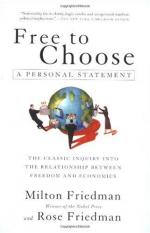
|
Chapter 1, The Power of the Market
• Societies operate more on the basis of voluntary cooperation than on command. Both parties benefit from exchange.
• Exchange is accomplished by the price system or free market in which all buyers and sellers act in their own best interest in a way that is best for everyone. This is Adam Smith's famous invisible hand concept.
• Prices serve three functions: They transmit information, result in the least costly method of production and lead to the distribution of income.
• The role of government is examined in theory and in practice.
Chapter 2, The Tyranny of Controls
• Over time, common sense dictates that people buy from the cheapest source and sell at the highest price.
• Free international trade without government interference is best. Despite this, there are tariffs and other trade barriers.
• The role of exchange rates is explained as is the principle of comparative advantage...
|
This section contains 795 words (approx. 3 pages at 300 words per page) |

|




